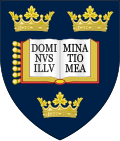History
In 1850 the school of law and modern history was created by university statute as one of three new degree-granting courses, which could only be taken after completing Literae humaniores or 'Greats'. In 1866 students were allowed to specialise solely in law and modern history. Between 1853, when the first examinations were sat, and 1872, 797 men graduated with such a degree. In the latter year the "uneasy alliance" of law and modern history was dissolved and the two subjects became separated. [4]
William Stubbs, Regius Professor of Modern History, founded the independent school of modern history in 1872, allowing post-classical history to be taught as a distinct subject at the university for the first time. By the time of Stubbs' retirement in 1884, the undergraduate degree in modern history had begun to rival Literae humaniores as the "training ground of the nation's elite". [5] Stubbs' own Select Charters (1870) and three-volume Constitutional History of England (1873-8) spearheaded the curriculum, educating young Englishmen about their "countrymen's long-standing commitment to freedom" and "what was peculiar, precious, and engrained" about being English. [5] Such an education was intended to prepare undergraduates for work as civil servants and imperial administrators. Students were taught via 'authorities', selected extracts of primary sources and works of secondary synthesis which left little room for alternative interpretation. [4] The school's first tutors, having taken their own degrees in Greats and suddenly required to teach a vast corpus of history extending from the fall of the Roman Empire to the end of the eighteenth century, welcomed their use. Stubbs' concentration on medieval English history defined the research and teaching favoured by the faculty for decades to come. In 1883 the board of modern history, which still exists today, was established to oversee the curriculum of the degree, with Stubbs as its inaugural chairman. [4]
In 1886 the faculty cemented its scholarly status with the establishment of its own publishing organ, The English Historical Review , the country's first academic history journal. A decade later in 1896 the faculty began hosting the annual Ford lecture series in English history, Samuel Rawson Gardiner being the first lecturer. [6] By 1901 the faculty was producing more graduates than any other degree course. Until 1913 it was required that all students take classical moderations before advancing to the modern history degree, leaving many undergraduates only two years to complete the entire syllabus. Tutors thus concentrated only on material which could appear in final examinations. The degree was examined solely in this way until 1908 with the introduction of an optional research thesis, though few students took up the offer to produce one initially. [4]
This page is based on this
Wikipedia article Text is available under the
CC BY-SA 4.0 license; additional terms may apply.
Images, videos and audio are available under their respective licenses.



